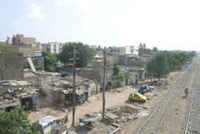Pakistan:Fears over planned Karachi rail project
On 3 September a Pakistan government committee approved a project worth Rs 128.5 billion (US$1.54 billion) to revive the Karachi Circular Railway and turn it into a modern commuter service, but not everyone is pleased: some 7,000 households will need to be relocated.
Karachi, 23 November 2009 (IRIN) - On 3 September a Pakistan government committee approved a project worth Rs 128.5 billion (US$1.54 billion) to revive the Karachi Circular Railway and turn it into a modern commuter service, but not everyone is pleased: some 7,000 households will need to be relocated.
“If they throw us into a God-forsaken place, how will my sons get to the city for work? There will be no buses coming out to the wilderness,” said Zaibunissa Rashid, a widow aged 65 who lives in Omar Colony UC-7, near the railway line.
Residents like Rashid say they are not squatters since they lease the land where they live from Pakistan Railways, the landowners.
The project is set to start in 2010 and be completed by 2014, with the Japan International Cooperation Agency (JICA) providing a $1.54 billion loan at 0.2 percent interest, repayable in 40 years.
The 43km rail transit system will ease the lives of some 500,000 daily commuters. Karachi, home to 16 million people, accounts for 95 percent of foreign trade and 30 percent of industrial production, yet has no mass transit system, according to consultants hired by the government committee.
Resettlement plan
A putative resettlement plan will provide the equivalent of $1,201 to each affected household as well as an 80 square metre plot in Juma Goth, where 121 hectares is being set aside for resettlement purposes, the consultants said. It will take Rashid’s sons half an hour to commute by bus to get to the city centre.
“I don’t want the money or a plot of land. I just want to stay here,” Rashid said, adding: “In these times of inflation and price hikes, if there is one thing I own it is this roof over our head, and now the government wants to take it from us.”
Others had a different opinion. “Yes, I hope we are relocated somewhere close by,” said Mahmood Hussain, a resident of Gharibabad. “We’re too poor to be able to build all over again. It has taken us a lifetime to build these homes.”
“For Rs 100,000 [$1,201] you can’t possibly build a house,” said Sagheer Ahmed, Hussain’s neighbour.
“If we are forced to move too far from where we are now, we will lose our jobs,” said Mohammad Sharif, another of Hussain’s neighbours.

